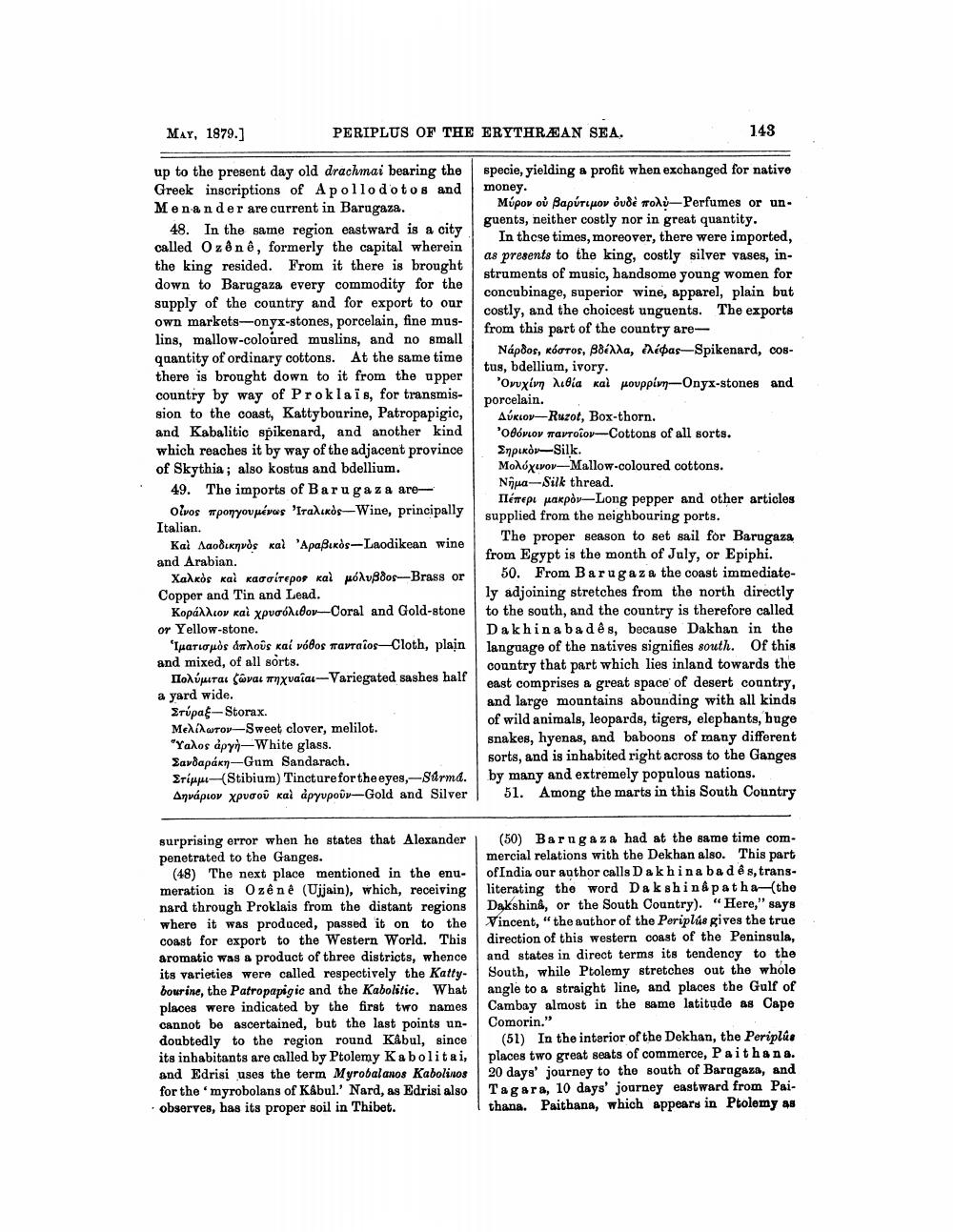________________
MAY, 1879.]
PERIPLUS OF THE ERYTHRÆAN SEA.
143
up to the present day old drachmai bearing the Greek inscriptions of Apollodotos and Menander are current in Barugaza.
48. In the same region eastward is a city called Ozone, formerly the capital wherein the king resided. From it there is brought down to Barugaza every commodity for the supply of the country and for export to our own markets--onyx-stones, porcelain, fine muslins, mallow-coloured muslins, and no small quantity of ordinary cottons. At the same time there is brought down to it from the upper country by way of Proklais, for transmission to the coast, Kattybourine, Patropapigic, and Kabalitic spikenard, and another kind which reaches it by way of the adjacent province of Skythin; also kostus and bdellium.
49. The imports of Baruga za are
Olvos oponyovuévas 'Iralunds-Wine, principally Italian.
Kal AaouKnuds kal 'Apaßids--Laodikean wine and Arabian.
Χαλκός και κασσίτερος και μόλυβδος--Brass or Copper and Tin and Lead.
Kopácov kai xpvoólidov-Coral and Gold-stone or Yellow-stone.
Iuariouds amous kai vódos Tarraios-Cloth, plain and mixed, of all sorts.
Ilohúrat sova mxvaiai-Variegated sashes half a yard wide.
Srúpaf-Storax. Meliuwtor-Sweet clover, melilot. 'Yalos apyi-White glass. Savdapákn-Gum Sandarach. Eripp (Stibium) Tincture for the eyes,-Sarmd. Ayvápov xpvooû kal åpyupowr-Gold and Silver
specie, yielding a profit when exchanged for native money.
Múpor où Bapúripov ovde moly-Perfumes or unguents, neither costly nor in great quantity.
In these times, moreover, there were imported, as presents to the king, costly silver vases, instruments of music, handsome young women for concubinage, superior wine, apparel, plain but costly, and the choicest unguents. The exports from this part of the country are
Nápdos, kóotos, Benda, chégas-Spikenard, costus, bdellium, ivory.
'Ovuxívn Nubia kal pouppiv-Onyx-stones and porcelain.
AÚktov-Ruzot, Box-thorn. 'OBórlov marroior-Cottons of all sorts. Enpuòr-Silk. Molóxivov-Mallow-coloured cottons. Niua-Silk thread.
Πέπερι μακρόν-Long pepper and other articles supplied from the neighbouring ports.
The proper season to set sail for Barugaza from Egypt is the month of July, or Epiphi.
50. From Barugaza the coast immediately adjoining stretches from the north directly to the south, and the country is therefore called Dakhina bades, because Dakhan in the language of the natives signifies south. Of this country that part which lies inland towards the east comprises a great space' of desert country, and large mountains abounding with all kinds of wild animals, leopards, tigers, elephants, huge snakes, hyenas, and baboons of many different sorts, and is inhabited right across to the Ganges by many and extremely populous nations.
51. Among the marts in this South Country
surprising error when he states that Alexander penetrated to the Ganges.
(48) The next place mentioned in the enu- meration is Ozê nê (Ujjain), which, receiving nard through Proklais from the distant regions where it was produced, passed it on to the coast for export to the Western World. This aromatic was a product of three districts, whence its varieties were called respectively the Kattybourine, the Patropapigic and the Kabolitic. What places were indicated by the first two names cannot be ascertained, but the last points undoubtedly to the region round Kabul, since its inhabitants are called by Ptolemy Kabolitai, and Edrisi uses the term Myrobalanos Kabolinos for the myrobolans of Kabul.' Nard, as Edrisi also observes, has its proper soil in Thibet.
(50) Barngaza had at the same time commercial relations with the Dekhan also. This part of India our author calls Dakhina badês, transliterating the word Dakshina patha-(the Dakshina, or the South Country). “Here," says Vincent, "the author of the Periplás gives the true direction of this western coast of the Peninsula, and states in direct terms its tendency to the South, while Ptolemy stretches out the whole angle to a straight line, and places the Gulf of Cambay almost in the same latitudo as Cape Comorin."
(51) In the interior of the Dekhan, the Periplus places two great seats of commerce, Paithana. 20 days' journey to the south of Barugaza, and Tagara, 10 days' journey eastward from Paithana. Paithana, which appears in Ptolomy 18




